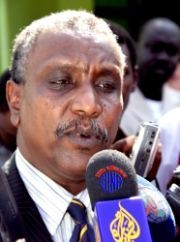Censorship of Sudan’s media threatens elections – SPLM
April 5, 2008 (KHARTOUM) — Control of Sudan’s media by the dominant National Congress Party is “poisoning” hopes for a free political process in the run up to the first democratic elections in more than 20 years, the junior partner in government said on Saturday.

But SPLM Deputy Secretary-General Yasir Arman told Reuters three years since the accord the NCP had stalled new laws to govern the media, still censored the printed press and had total control over state television and radio paid for with tax money.
Arman said under these circumstances it would be difficult to hold truly fair elections.
“How do you go to the elections with the media controlled by the state? There will be no equal opportunities,” he said.
NCP officials were not immediately available to comment.
While Sudan’s printed press is freer than in other Middle Eastern countries with sporadic censorship, television and radio remain firmly in the NCP’s grip.
Critics, however, often complain of a link between advertising by state companies in print media and editorial content.
“If you are not pro-NCP you will not be given an advertisement which is the main source of funding news print media,” he said. “They are poisoning the environment of democratic transformation.”
Arman said some of the NCP controlled newspapers played a “destructive role” by writing false stories which incited religious and ethnic hatred.
“These are issues at the heart of the (democratic) transformation,” he said.
“I believe there are certain quarters in the NCP who would like to keep the status quo of yesterday (who) are not willing to accept the new realities and build a new society.
Arman said the SPLM were also to blame for not making it a priority to develop their own strong media structures.
“It is key to democratisation that the SPLM take a major role in building parallel media institutions which respect professionalism and are available to everyone to express their views.”
Sudan’s north-south civil war broadly pitted the Islamist Khartoum government against the mainly Christian and animist southern rebels. The conflict, which claimed 2 million lives, was complicated by oil, ethnicity and ideology.
(Reuters)
